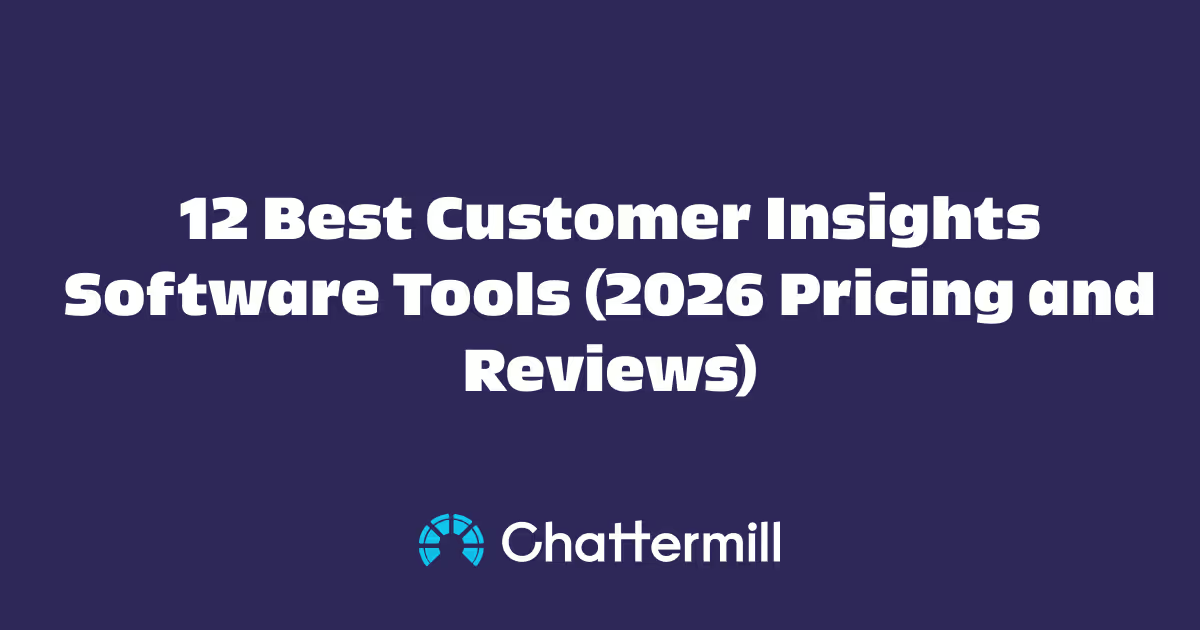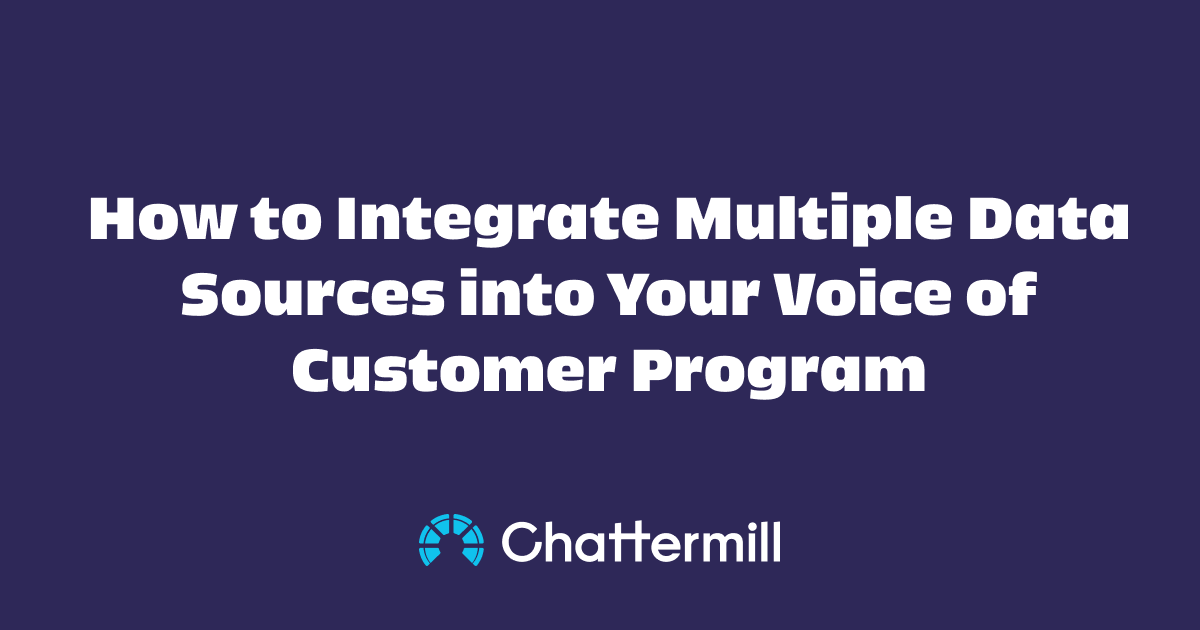When you think of customer-centric industries, smart money says finance isn’t at the top of your list.
To be fair, there’s good reason for that. Banks and insurance companies traditionally cultivated trust and economic stability as a way to win consumer confidence. It was a great model in the fifteenth century – and even the twentieth century. But all that needs to change – and it needs to start now.
McKinsey research shows that banks who lead in customer satisfaction have better total shareholder return, increased growth, and decreased costs. If that’s not enough, the same research showed a correlation between customer satisfaction and profitable consumer behavior.
There’s really no downside when you can increase revenue and decrease costs, right? Increasing your customer satisfaction scores might be the closest thing to easy money out there.
If you’re ready to learn more about how you can reap the rewards of satisfied customers, we’ve got you covered.
What This Looks Like in Practice
Our use cases show how CX Intelligence can be applied to modern-day finance to improve customer satisfaction. CX Intelligence is vital for growth strategies because it helps you better understand what your customers want and how you can deliver it to them.
With enough customer experience data you’ll be able to outperform your competition, even in a crowded market like fintech. There’s no shortage of customer feedback, so let’s see how a thoughtful approach to CX Intelligence projects can lead to financial reward.
Here are the top seven use cases for CX Intelligence in the finance industry.
1) Improve digital conversion
Non-banking companies are offering financial services at an alarming rate. The new kids on the block are capitalizing on the long-term investments of the traditional finance community and taking market share in the process. To fend off these new competitors, finance companies need to focus on customer experience and all the ways they interact with customers.
The good news is the industry recognizes this. In 2022, 69% of financial services companies said they believe digital transformation is central to their ability to grow. With aging technology, legacy systems, and stringent compliance and regulatory obligations, they have an uphill battle.
Banks and insurance companies who rise to the challenge of improving digital conversions have much to gain. This is already playing out in the banking sector. Customers are increasingly digital in their banking activities, resulting in higher customer satisfaction rates.
Digital transformation requires investing in new capabilities and addressing the increasingly demanding consumer who has demonstrated a strong preference for a better customer experience. With the right partner and tools, CX Intelligence can feed into an experience-led growth strategy that rivals the most agile disruptors in the industry.
If you’re feeling skeptical about the value of CX in traditional finance, consider this. The top fintech companies rely on CX technology and expertise to ensure every touchpoint in their business is customer focused. Chattermill works with finance industry leaders, like Wise, AXA, TSB, ClearScore, Simply Business, and Nutmeg, who are all prioritizing customer experience as central to their operating model.
Chattermill provides finance companies with a complete picture of their customer experience data, which helps identify gaps in their digital conversion initiatives. Our proprietary AI model Lyra gives insights into where customers are experiencing friction in their finance ecosystem and alerts them to what needs to be done to improve customer satisfaction.
2) Improve product experience
While traditional finance companies are quickly stepping up to improve their digital conversions, new challengers are quickly stealing market share. Where all financial transactions used to happen within the hallowed halls and marbled floors of big banks, consumers are increasingly attracted to new technologies offering a better customer experience and drastically reduced rates.
Many of the new fintech companies rely on customer feedback for product development decisions. Insights gleaned from CX Intelligence guides them to develop and ship the features most important to customers first.
Wise, a foreign exchange fintech, improved their product experience by creating a very easy-to-use online platform. They focused on making the transfer experience enjoyable and reducing fees – a revolutionary approach for an industry that often left the average consumer feeling daunted by complex fee structures and rapidly changing exchange rates.
Wise’s customer-centric approach has been a huge hit with customers which has led to word-of-mouth referrals and significant growth for the company.
CX Intelligence can also help finance companies differentiate their products for competitive advantage, especially as “mobile first” generations enter the market. Digital natives have different expectations about how they want to be contacted and how they want to access finance products. Customer experience data is a critical tool for developing apps and functionality that meets their needs and how they expect to be treated by financial institutions.
Chattermill helps finance companies Identify and quantify the most requested product features using insights from their CX Intelligence. It allows businesses to categorize customer feedback by theme to give product managers precise insights into the best way to plan product releases and plot technology roadmaps. This increases the likelihood of quicker return on investment for your product development efforts.
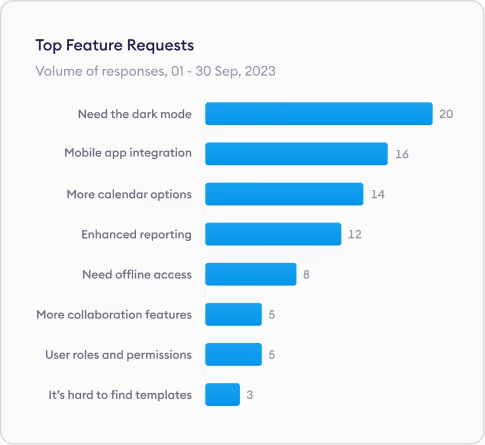
3) Increase customer retention
The upstarts and start-ups of the fintech world have one thing in common – they’re carving out the most profitable parts of banking for themselves. For example:
- Wise specializes in cross-border payment transfers. Their mission is to help people save money every time they transfer and exchange currencies.
- TSB, a UK bank, has developed a marketplace of third-party products and services for their individuals, including Wealthify, ApTap, and Legal & General. Businesses have access to services from Square and Enterprise Nation.
- Nutmeg is a digital wealth manager providing a simplified and transparent approach to investing. They build and manage diversified portfolios based on people’s goals and investment styles, using technology to keep charges low.
PwC’s Retail Banking 2025 and Beyond report identifies the reason this is happening. “Established, cash-rich brands in the technology, media and entertainment sectors aggressively seize more of the customer relationship through an improved user experience and hyper-personalized offering”.
In the process, these neo finance companies are attracting young customers who are at the start of their earning years, an ideal time to lock someone in for life. They’re also appealing to a highly profitable market segment for traditional financiers. The self-service element of apps and digital platforms to easily manage money and make investments is a huge drawing card for savvy consumers.
Retaining the right customers
So how can traditional finance companies retain their best customers while attracting young people who have many years of spending ahead of them? Getting a laser focus on customer experience to level the playing field is the first step.
To do that, finance companies need to focus on the Net Promoter Score (NPS) and Customer Satisfaction Score (CSAT) used to track customer satisfaction. Data is available in a myriad of customer feedback forms, customer service calls, online reviews, app reviews, and surveys.
Analyzing customer experience data
Customer experience will be the key differentiator to competition, both from the finance industry and from outside challengers. Chattermill provides agility in analyzing customer sentiment and demonstrating the impact of customer experience in your organization. It’s all within reach using a dashboard that gives you an immediate view of how you’re tracking.
4) Improve Voice of Customer (VoC) metrics
Net Promoter Scores (NPS) and Customer Satisfaction (CSAT) scores are two popular VoC metrics that finance companies can use to better understand what their customers think and feel. Understanding the trends that make your scores rise or fall is essential to improving customer sentiment.
Frontline staff can have an outsize influence on the performance of each branch or office. A strong CX strategy can help align staff to branch goals and lets you quickly discover what’s driving customer sentiment.
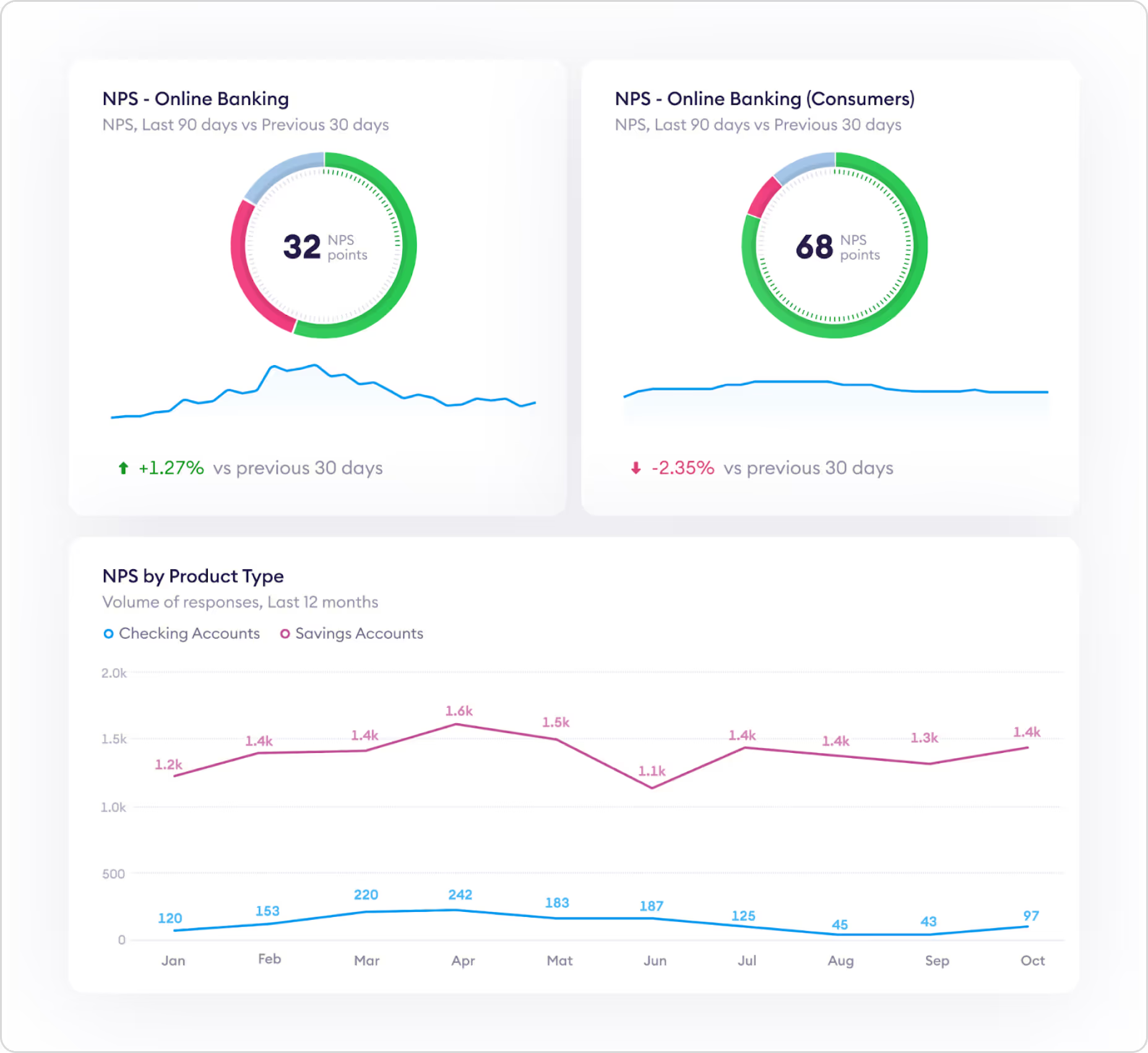
Whether a customer comes into the branch to meet with a lending specialist, deposit cash, have coins counted, access a safe deposit box, or meet with a business banking manager, their experience influences how they feel about your organization and how loyal they remain over time.
For banks, insurance companies, and credit unions – who still have a high number of in-branch transactions – follow-up surveys provide a wealth of information about the customer experience. These surveys provide an opportunity to reduce friction and ease pain points for customers but analyzing large volumes of data can be difficult, if not impossible.
When you combine internal information with publicly available review information on places like social media, a branch manager can quickly get an idea about what’s working well and what needs to change. Having the ability to compare results and measure how your VoC metrics change over time helps branch managers improve the profitability of their business.
Analyzing customer experience data can help identify performance issues with staff, misalignment on goals, or areas where more training is required. Chattermill provides impact analysis and automated feedback summaries so you can make accurate assessments about critical issues that impact your NPS and help you drive growth.
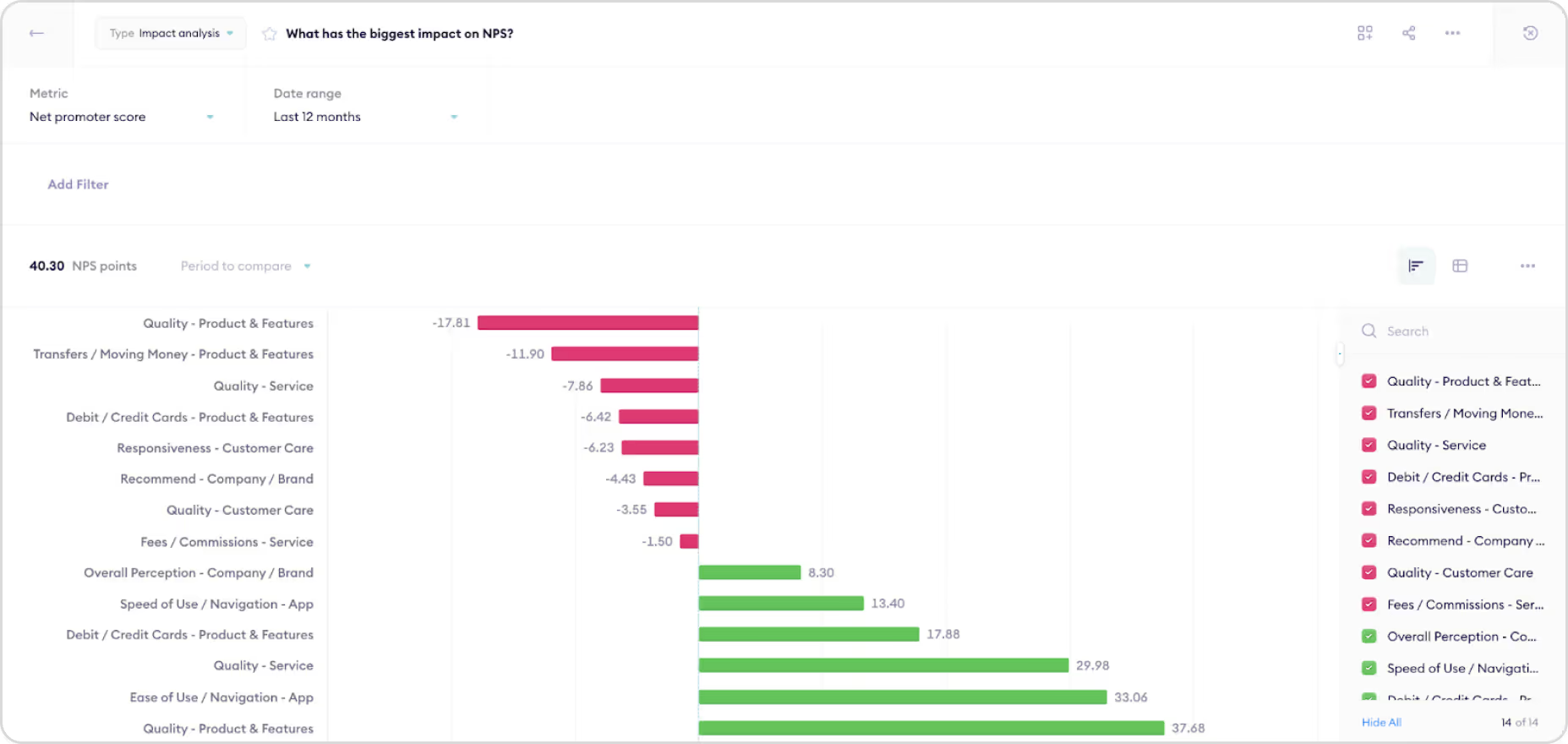
5) Reduce contact volume
Reducing contact with support teams is a critical metric for finance companies. High complaint volumes can quickly impact profitability if they’re not properly addressed.
The costs to the business for customer contact can quickly pile up, especially when they occur in large volumes.
- Personnel costs in wages and salaries paid to employees handling complaints
- Training costs to properly handle complaints per regulations and company policies.
- Technology costs for complaint management software, both implementation and recurring operational costs
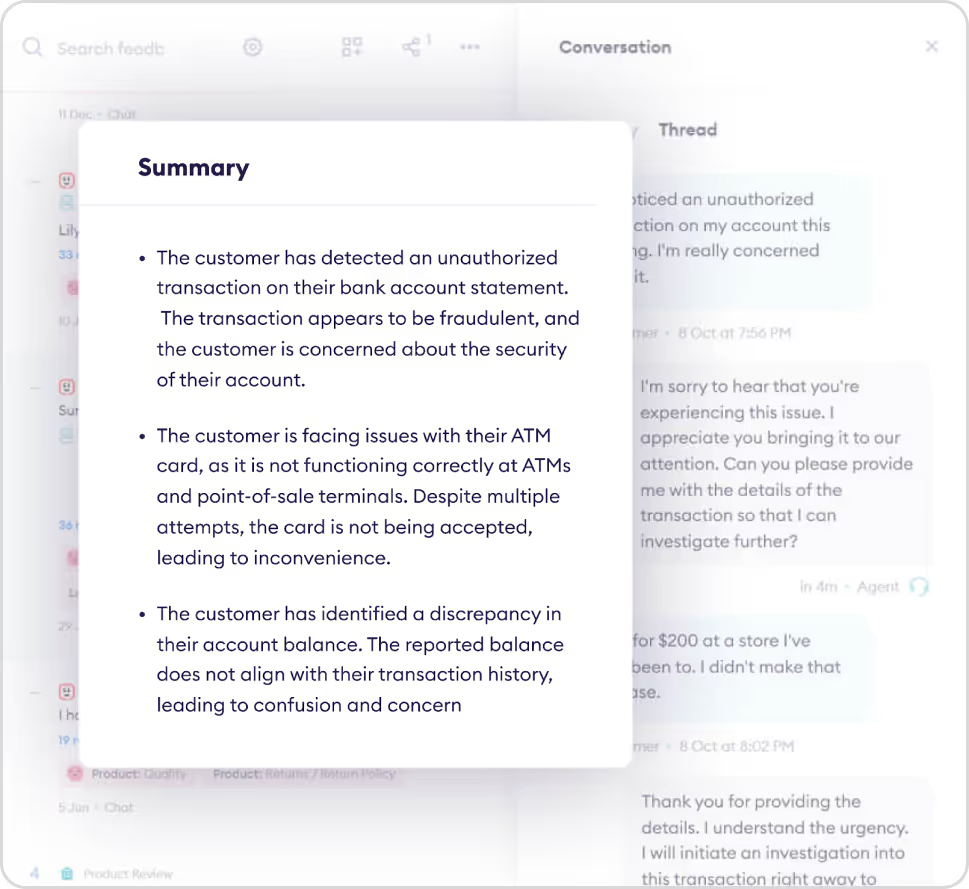
- Procedural costs to investigate, correspond with the customer, make corrections or compensation
- Fines or penalties levied by regulators if laws or guidelines haven’t been followed
- Reputational costs related to complaints becoming public through customer feedback that damage brand perception and consumer trust.
Being able to quickly identify trends is essential to keeping on top of problems before they get out of hand. This is especially true if you’re experiencing seasonal shifts in contact volumes. Customer feedback can help you pinpoint issues that need to be corrected or identify topics that can be addressed through content programs, customer outreach, or automated responses.
CX Intelligence holds the key to identifying root causes of customer contact and developing an action plan to reduce or eliminate future contact. Finance companies can use customer satisfaction metrics to track how customer's perspectives change as you implement strategies to reduce contact.
Chattermill provides transparency into the specific reasons why customers are contacting support. It allows finance companies to analyze customer experience data so you can react in near real-time to improve customer outcomes. Sentiment analysis contributes to chatbot success. In addition, finance companies can run reports to guide development of FAQs.
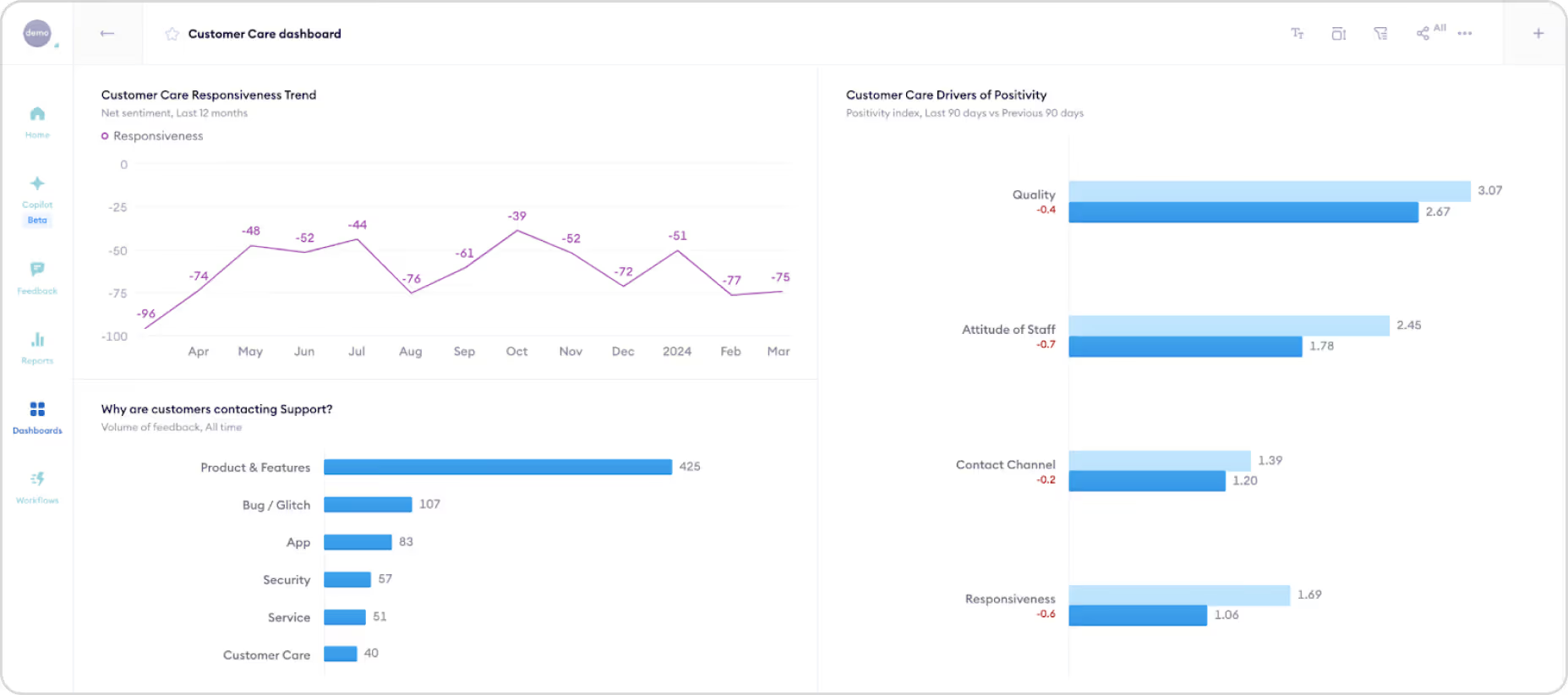
6) Improve share of wallet
One of the most overlooked uses for customer experience data in finance is for targeted cross-selling and upselling. In many cases, customers aren’t even aware of the number of products and services finance companies can offer.
The basic principle of cross-selling is to encourage an existing customer to purchase new services or additional products. It’s designed to increase revenue while satisfying unmet needs of the client. Financial companies may improve share of wallet by suggesting products the customer may or may not know about, including things like:
- Credit or debit cards
- Auto loans
- Investment services
- Personal loans
- ID monitoring
- Insurance policies
Targeted cross-selling of new products
For targeted cross-selling to be successful, it’s important for financial institutions to know what their customers want, what they need, and what keeps them awake at night. For example, someone purchasing their first house may need life insurance. A graduate setting up a direct deposit account for their first “real” job is likely to consider a credit card. The opportunity for the finance company is to make the right suggestion at the right time.
Upselling to profitability
Often the most popular product with customers is also the least profitable one for the company. This is where an upselling strategy can add significant heft to the bottom line. A great example is ClearScore, a fintech company offering a free credit score and an accompanying report “for free, forever”.
ClearScore uses customer experience data to recommend products that are most likely to improve the credit score of people like them. The customer has peace of mind they have a high likelihood of being approved for the recommended credit products they need. ClearScore gets a referral bonus or commission on each transaction. With more than 20 million people globally using ClearScore, the potential for upselling to increase share of wallet is huge.
Why cross-selling and upselling are important for finance companies
Inflation, rising interest rates, and a drop in consumer confidence make it more important than ever for banks and financial institutions to master customer experience. McKinsey research shows an uncertain economic environment creates changing financial needs for customers, all of which can result in the need for new financial products or services.
- 35% expect household spending to grow by more than 50%
- 25% are planning to pay down more than 75% of household debt
- 15% are increasing emergency and household savings.
So how can customer experience data help finance companies improve share of wallet? Customer feedback is used by bank associates, insurance brokers, and fintech platforms to understand what drives customers to invest in new products or services, or upgrade the ones they already have. Chattermill provides all the insights needed to know what to offer customers and when they’re most likely to purchase.
7) Regain trust
As the finance industry becomes more fragmented, trust cultivated over decades can be eroded. Add in world events like the global financial crisis and more recent crypto scandals, and it’s easy to see why consumers are reconsidering their options.
The 2023 Edelman Trust Barometer indicates there’s a long way to go before consumers are comfortable with finance again. Globally, financial services is on par with the fashion industry as one of the least trusted sectors in the world, with only social media performing worse.
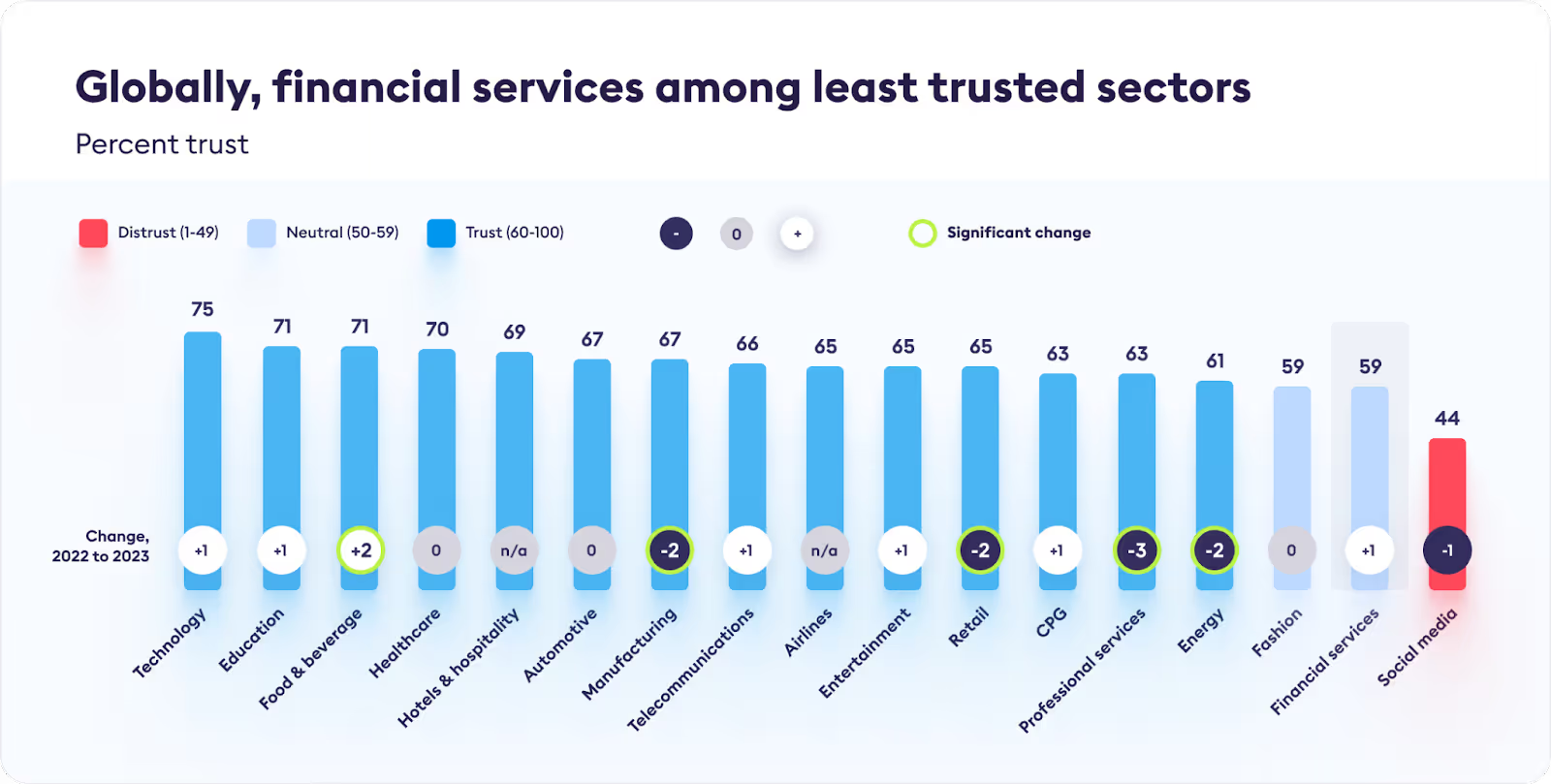
Banks garner the most trust, but fintech and crypto are in negative territory, with less than half the global population trusting them.
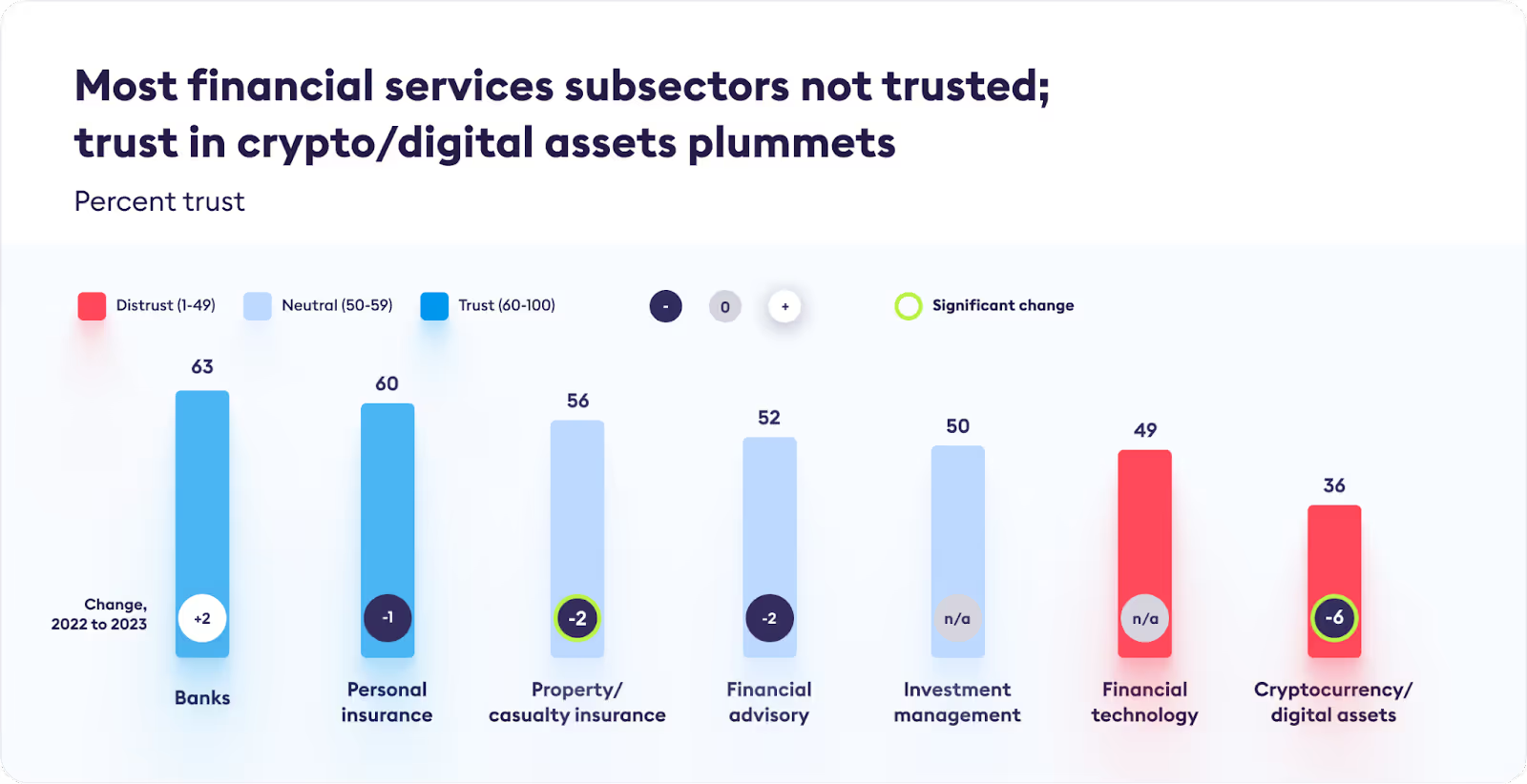
Trust is an intangible metric. It’s very hard to measure, so the best you can do is to try to approximate it with feedback. The majority of people say “a person like myself” is a trusted voice when it comes to feedback about a company. That’s why customer reviews and customer experience data – VoC metrics – is so valuable.
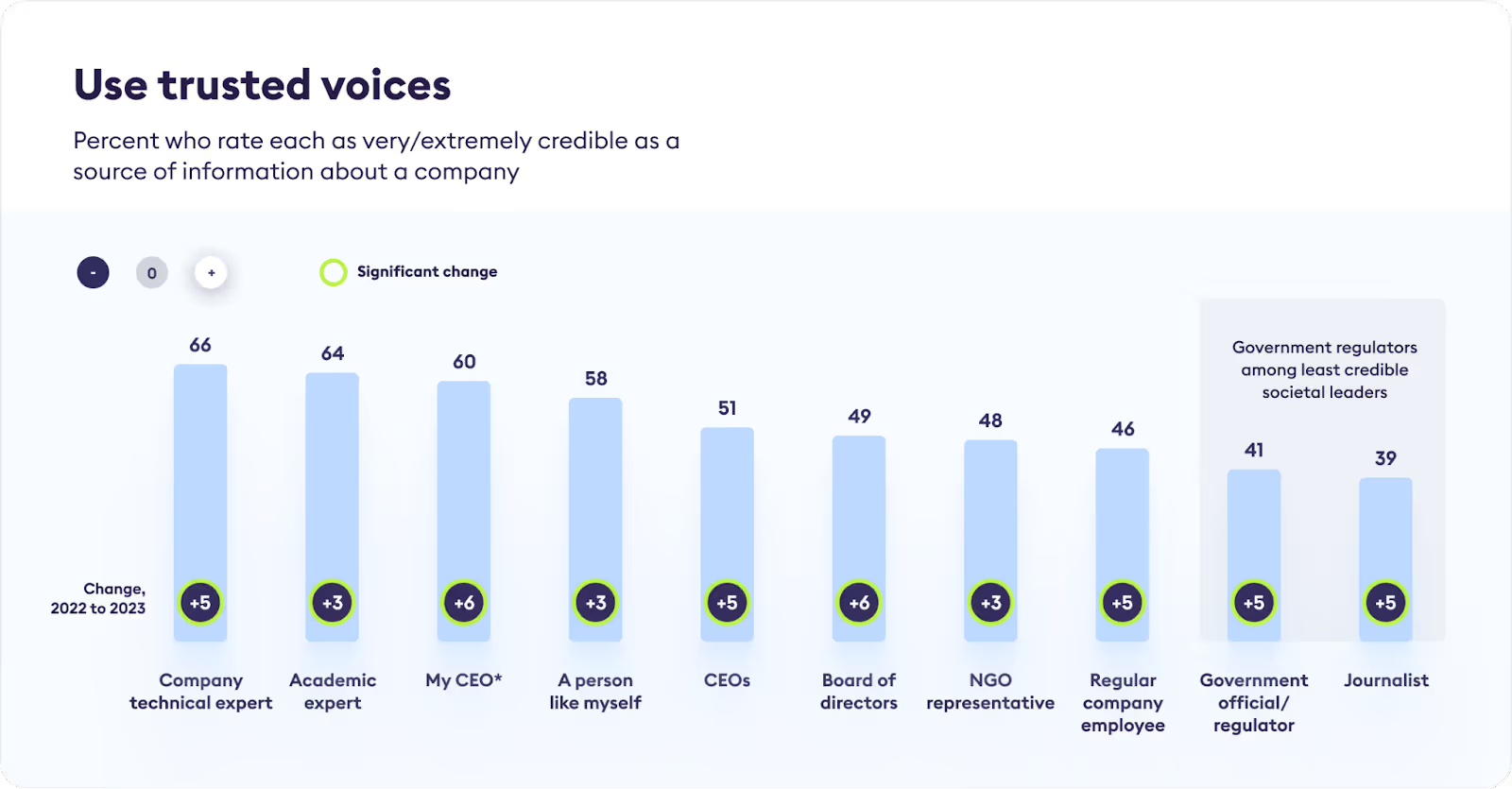
Chattermill is able to measure trust – both positive and negative attitudes – using the NPS. Analyzing large volumes of customer experience data allows you to understand how to drive the NPS metric that reflects greater levels of trust in a financial organization.
CX Intelligence allows companies to solve the issues and identify trends at the source – customer data. Knowing what people are saying and feeling gives you the best chance to improve the customer experience. This involves analyzing raw customer service interactions as well as post-interaction surveys – the kind of work Chattermill helps finance companies with every single day.
Are you ready to get started? Let Chattermill show you how to convert your customer experience data into long-term profit.
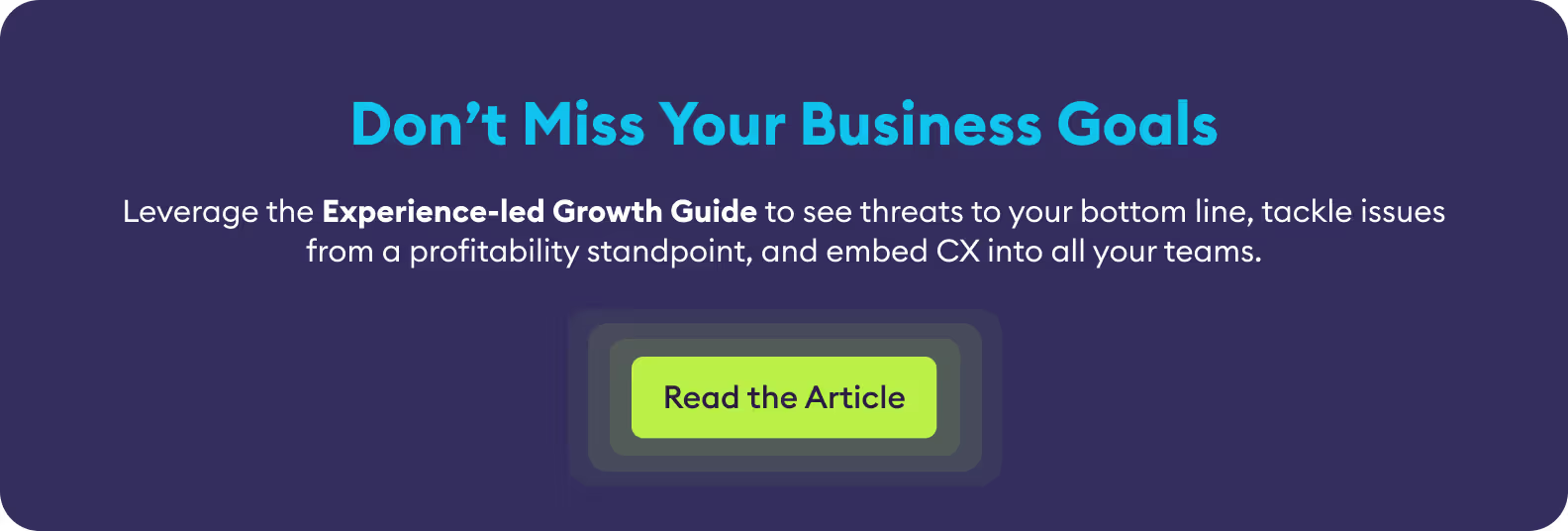
Customer Experience Intelligence in Finance: FAQs
What is customer experience intelligence in finance?
Customer experience intelligence in finance is the use of data, feedback, and analytics to understand how customers interact with banks, fintechs, and financial services. It helps institutions improve trust, loyalty, and satisfaction.
Why is customer experience intelligence important in financial services?
It enables financial institutions to detect pain points, enhance digital services, personalize offerings, and strengthen customer relationships in a highly competitive market.
What are the main use cases of customer experience intelligence in finance?
Key use cases include improving digital banking experiences, reducing churn, enhancing customer support, detecting fraud signals, personalizing financial products, tracking customer sentiment, and ensuring compliance.
How does customer feedback support financial experience intelligence?
Customer feedback provides insights into frustrations with apps, transactions, or support services. Analyzing this feedback helps financial providers address issues quickly and improve trust.
What role does AI play in customer experience intelligence for finance?
AI enables real-time sentiment analysis, predictive modeling, and pattern detection across large volumes of customer interactions. This makes financial services more responsive and customer-focused.
How can financial institutions personalize experiences using customer intelligence?
By analyzing customer data and behavior, banks and fintechs can offer tailored recommendations, financial advice, and customized product offers to meet individual needs.
Which areas of finance benefit most from customer experience intelligence?
Digital banking, payments, insurance, wealth management, and lending all benefit by improving convenience, transparency, and personalization for customers.
How does customer experience intelligence drive retention in finance?
By proactively resolving issues, simplifying processes, and delivering personalized value, financial institutions can increase satisfaction, reduce churn, and build long-term loyalty.





